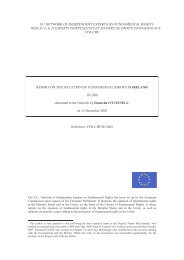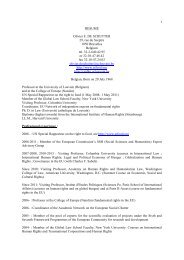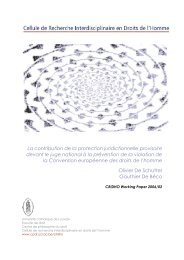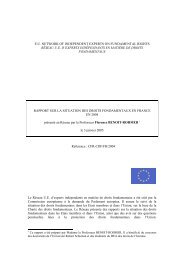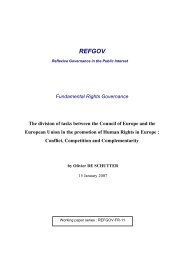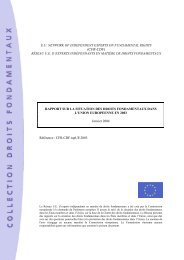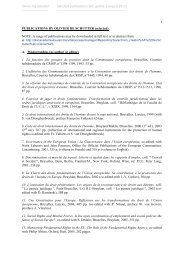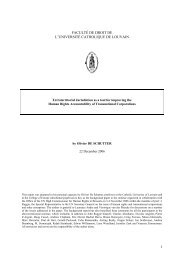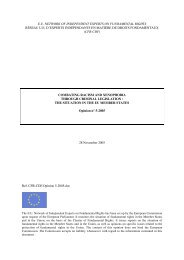The Prohibition of Discrimination under European Human ... - cridho
The Prohibition of Discrimination under European Human ... - cridho
The Prohibition of Discrimination under European Human ... - cridho
You also want an ePaper? Increase the reach of your titles
YUMPU automatically turns print PDFs into web optimized ePapers that Google loves.
thematic report<br />
■ THE PROHIBITION OF DISCRIMINATION UNDER EUROPEAN HUMAN RIGHTS LAW ■<br />
<strong>of</strong> the Convention ». 105 In the view <strong>of</strong> the author <strong>of</strong> this report, this confuses the obligation to provide effective<br />
accommodation (or to treat differently situations which require such differential treatment) with a form <strong>of</strong> positive<br />
action, which it is not. In Chapman, seven judges106 filed a joint dissenting opinion contesting the approach <strong>of</strong> the<br />
majority, as exhibited in the extract cited above.This approach, the dissenters noted,<br />
ignores the fact, earlier acknowledged by the majority, that in this case the applicant's lifestyle as a Gypsy<br />
widens the scope to Article 8, which would not necessarily be the case for a person who lives in conventional<br />
housing, the supply <strong>of</strong> which is subject to fewer constraints.<strong>The</strong> situations would not be likely to be analogous.<br />
On the contrary, discrimination may arise where States, without objective and reasonable justification, fail to<br />
treat differently persons whose situations are significantly different (see Thlimmenos v. Greece, no. 34369/97, §<br />
44, ECHR 2000-IV).<br />
<strong>The</strong> obligation to take into account relevant differences in situation in drafting legislations <strong>of</strong> a general scope <strong>of</strong><br />
application should not be confused with the introduction <strong>of</strong> positive action measures. Indeed, <strong>under</strong> Article 4 <strong>of</strong><br />
the Council <strong>of</strong> Europe Framework Convention for the Protection <strong>of</strong> National Minorities, 107 where States parties are<br />
led to adopt, « adequate measures in order to promote, in all areas <strong>of</strong> economic, social, political and cultural life, full<br />
and effective equality between persons belonging to a national minority and those belonging to the majority »,<br />
taking due account in this respect <strong>of</strong> « the specific conditions <strong>of</strong> the persons belonging to national minorities »,<br />
such measures are specifically designated as not being discriminatory in character.<br />
2. Disability<br />
Two outstanding questions <strong>of</strong> interpretation <strong>of</strong> the provisions <strong>of</strong> Directive 2000/78/EC relating to the equal<br />
treatment <strong>of</strong> persons with disabilities in employment and occupation may be illuminated by the relevant case-law<br />
<strong>of</strong> the <strong>European</strong> Court <strong>of</strong> <strong>Human</strong> Rights. A first question <strong>of</strong> interpretation concerns the imposition <strong>of</strong> health and<br />
safety requirements creating an obstacle to the recruitment, or the retainment, <strong>of</strong> workers with a certain disability<br />
putting either themselves or the co-workers or the general public at risk <strong>under</strong> certain conditions <strong>of</strong><br />
employment. 108 It is well documented that occupational health and safety regulations may constitute a significant<br />
barrier to the access to employment <strong>of</strong> workers with disabilities or to their retention. 109 Article 8 ECHR protects the<br />
right to respect for private life, and has been interpreted broadly by the <strong>European</strong> Court <strong>of</strong> <strong>Human</strong> Rights to<br />
restrict not only the power <strong>of</strong> the States Parties to interfere with the right to privacy <strong>of</strong> the individual <strong>under</strong>stood<br />
as the sphere <strong>of</strong> intimate matters – and, in particular, to seek information he or she wishes to see remain<br />
104<br />
105<br />
See however, for a finding <strong>of</strong> violation <strong>of</strong> Article 8 ECHR because <strong>of</strong> the lack <strong>of</strong> procedural safeguards in the eviction <strong>of</strong> the applicant from a<br />
caravan site on which he and his family had lived for fourteen to fifteen years, Eur. Ct. HR (1st sect.), Connors v. the United Kingdom (Appl. N°<br />
66746/01), judgment <strong>of</strong> 27 May 2004.<br />
Eur. Ct. HR(GC), Chapman v. the United Kingdom (Appl. N°27238/95), judgment <strong>of</strong> 18 January 2001, at § 95.<br />
106 Mr Pastor Ridruejo, Mr Bonello, Mrs Tulkens, Mrs Strá_nická, Mr Lorenzen, Mr Fischbach and Mr Casadevall.<br />
107<br />
108<br />
109<br />
ETS, n° 157. Opened for signature on 1 February 1995, and entered into force on 1 February 1998.<br />
<strong>The</strong>se questions are developed in detail in the report commissioned by the EC Network <strong>of</strong> experts on disability discrimination for the<br />
Commission <strong>of</strong> <strong>European</strong> Communities, DG Employment and Social Affairs : O. De Schutter, Pre-Employment Inquiries and Medical Examinations<br />
as Barriers to the Employment <strong>of</strong> Persons with Disabilities : Reconciling the Principle <strong>of</strong> Equal Treatment and Health and Safety Regulations <strong>under</strong><br />
<strong>European</strong> Union Law, August 2004, 54 pp.<br />
See in particular <strong>The</strong> extent <strong>of</strong> use <strong>of</strong> health and safety requirements as a false excuse for not employing sick <strong>of</strong> disabled persons, study prepared by<br />
IRS Research for the Health and Safety Executive and the Disability Rights Commission, HSE Research Report 167, 2003,<br />
40



